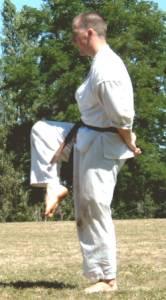Practical Arts, Practiced Arts
During practice please feel free to ask questions, offer suggestions and make comments. This would most appropriately be done after the initial instruction has been given. In the dojo it is considered very rude to correct a student of a higher rank simply because they have more experience and probably know the intent or mechanics of a particular technique better than a lower ranking student. It is almost never inappropriate to request a demonstration or an explanation (provided that it is not interrupting the teaching process and if time allows).
There are many occasions when an answer is not at the ready. This should not discourage you: sometimes the concept is unclear to begin with. Many martial arts are composed of traditions that are very culturally specific to the oriental method of study. It makes sense that a person who hadn't been exposed to them wouldn't understand the intricacies of eastern culture from the late nineteenth century. In other cases, a move or a concept should be explored by the student before a clear "answer" is given.
An act of faith is required before a martial artist can begin to understand the moves and ideas he or she is being taught. This is not "blind faith," as one should already have established that what their sensei is teaching is good for their body, mind and spirit. In this case, Faith is the belief in what is unseen but is known to be true and the action that demonstrates said knowledge. The student must practice long and hard until one day his or her mind will softly "click" on and they will understand (often this is preceded by a partial explanation by the sensei).

This "slow" method of teaching is preferable to a school that claims to be able to make you a master in a month (or any time less than twenty years!) or announces that it teaches the "secrets" of such and such a style. Almost all styles of martial arts have their "secrets." These "secrets" are moves or ideas preserved meticulously over time to maintain the purity of the school. If, for example, I were to learn (as a novice) the "Flying Squirrel Technique" of the Five Animals School of Kung Fu, I may decide that there is nothing left to learn from that school and give up my practice. Worse would be if I tried to teach the technique to someone else because, being a novice, I would almost certainly fail to include in my instruction a vital element to the movement and I would definitely omit essential spiritual elements to the move. I would suffer as a bad teacher and my students would suffer from my bad teaching.
The serious practitioner of the martial arts has a responsibility to find a school that teaches true principles and is not given to gimmicks. I will discuss "secrets" in a later post, but suffice it to say that if you should stumble across them in your studies, strive to find your own sense of what they mean and never give up. If you encounter "secrets" in the Way, take that as a compliment from your sensei-it means that they think you are ready.
"Give not that which is holy unto the dogs, neither cast ye your pearls before swine, lest they trample them under their feet, and turn again and rend you." -King James Version of the Bible Matthew 7:6

0 Comments:
Post a Comment
<< Home